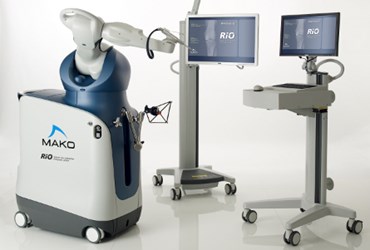Stryker CEO: With MAKO, Company Is "Not Concerned" About Competition
By Jof Enriquez,
Follow me on Twitter @jofenriq

Stryker Corporation, owner of the MAKO robotic assisted surgical platform, is set to train an initial group of surgeons who will perform total knee replacements (TKR) using the MAKO system later this year.
"The initial phase of our launch, which will get underway late this year, will target a small group of existing robotic users who represent the key opinion leaders in the surgeon community," said Katherine A. Owen, VP of Strategy & Investor Relations at Stryker, during an earnings call, according to a Seeking Alpha transcript. "This will help drive a database of outcomes that will allow for a presence at key podium presentations beginning in 2017. We will also target current non-robotic surgeons who are also KOLs and have extensive experience with our triathlon total knee."
In August, the company received clearance from the U.S. Food and Drug Administration (FDA) to expand the indication of MAKO to include TKR procedures, building on its original offering of partial knee resurfacing and total hip applications.
According to the transcript, Owen said that Stryker and its surgeon partners will be "evaluating everything from implant positioning, adverse events, ligament releases, patient satisfaction” as the initial focus. “Absolutely over time we'll be developing, I'm sure, more robust clinical evaluations or trials," she added.
Stryker plans to have a limited market release of MAKO for TKR by year’s end, ramping up in 2016 toward a full commercial release in 2017. "I think there will be downstream applications in other areas of joints, whether it's in the shoulder or in the spine, but that is multi years away from where our focus is right now," said Owens, according to the transcript.
Since acquiring MAKO for $1.5 billion in 2013, Stryker has considered the platform as a growth accelerator for the company. Stryker initially experienced some issues integrating MAKO into its reconstructive business, and 2014 robot sales were lower than expected. However, momentum shifted during the fourth quarter last year and carried over to the third quarter of 2015. The company reported that it sold 17 MAKO robots sold globally in 2015’s third quarter, bringing the year-to-date total to 41, according to the transcript.
That increase in robot sales helped lift Stryker's third quarter numbers. Trauma & Extremities sales grew 9.1 percent, and Hips and Knees sales rose 3.1 percent and 3.5 percent, respectively, according to Zacks. Growth in Trauma & Extremities reflected a strong double-digit organic growth for U.S. foot and ankle business. Overall, net sales grew 1.3 percent to $2.4 billion, and reported net earnings increased 428.1 percent in the quarter to $301 million, according to a company statement.
It has taken some time for Stryker to leverage its MAKO acquisition, but a four-prong approach to convince cost-conscious customers to invest in such a large capital investment (over $1 million per surgical unit) is now paying off. In addition, there are few competitors with a robotic system as robust as MAKO, according to Stryker’s top executive.
According to the call transcript, Kevin Lobo, chairman, president and CEO of Stryker, is confident that, with MAKO, "we really believe we're alone in the purely true robotic space, and we have a long runway ahead of us. And we're really not concerned with the competition."
While Stryker's leadership is bullish about MAKO's prospects and the U.S. market overall, they were not too keen on emerging markets, such as China, Brazil, Russia, and Turkey. The company says investments in emerging markets will have to be dialed back because of risk factors, at least in the short-term.
"So really outside the U.S., it's very much China and Brazil that are pulling down the numbers. Europe, with the Transatlantic Operating Model, we're really seeing very good momentum," said Owens, per the transcript.
"We do plan to grow outside the U.S., and that's why the Operating Model changes are extending even beyond Europe to include the other countries of the world, because I think that direct connection to our product divisions will drive growth everywhere else outside the United States. And Europe is very instructive. What we've seen in Europe we know we can replicate in other countries," added Lobo, according to the transcript.
Lobo also said that acquiring “attractive” target companies is still a priority. However, he said the company is closely studying valuations, cultural fit, and other factors before entering into any M&A deals.
